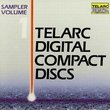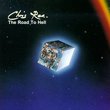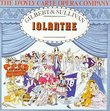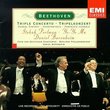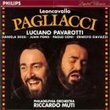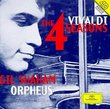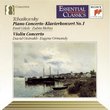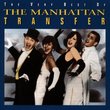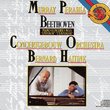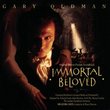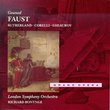| All Artists: Giuseppe Verdi, Vienna Philharmonic, Georg Solti, Joan Sutherland, Marilyn Horne, Luciano Pavarotti, Martti Talvela, Vienna State Opera Chorus Title: Verdi: Requiem / Sutherland, Horne, Pavarotti, Talvela, Solti Members Wishing: 1 Total Copies: 0 Label: Decca Release Date: 10/25/1990 Genre: Classical Styles: Opera & Classical Vocal, Historical Periods, Early Music Number of Discs: 2 SwapaCD Credits: 2 UPC: 028941194428 |
Search - Giuseppe Verdi, Vienna Philharmonic, Georg Solti :: Verdi: Requiem / Sutherland, Horne, Pavarotti, Talvela, Solti
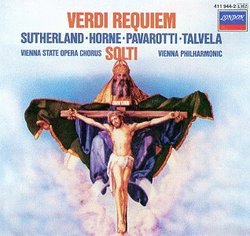 | Giuseppe Verdi, Vienna Philharmonic, Georg Solti Verdi: Requiem / Sutherland, Horne, Pavarotti, Talvela, Solti Genre: Classical
If you value the drama and terror of Giuseppe Verdi's sacred masterpiece, you need to hear this. Solti's "Dies Irae" is overwhelming, the drums pounding and the chorus sounding as if it's writhing in hell's torments. W... more » |
Larger Image |
CD DetailsSynopsis
Amazon.com If you value the drama and terror of Giuseppe Verdi's sacred masterpiece, you need to hear this. Solti's "Dies Irae" is overwhelming, the drums pounding and the chorus sounding as if it's writhing in hell's torments. What Solti's intense, operatic conception lacks in spirituality it more than makes up for in the way it grips you by the throat and never lets go. The solo quartet, with one exception, is among the best assembled in the stereo era. Pavarotti shines, and Talvela's authoritative basso profundo is a rock-solid anchor. Horne's trademark register break can be a distraction at times, but she's thrilling. With a more idiomatic soprano, this would have been an unbeatable foursome, but Sutherland is sadly miscast here, most damagingly in the "Libera me." Sonics were demonstration quality in their day and are still competitive with the best. For a more devotional approach, Giulini is a good choice. Vintage performances by Toscanini (RCA and Music & Arts) and Serafin on Pearl (the latter with a true golden age vocal quartet) are desirable, as are stereo versions by Daniel Barenboim on Teldec and Robert Shaw on Telarc. Solti's remake for RCA is less attractive; you can't go wrong with this one. --Dan Davis Similar CDs
Similarly Requested CDs |
CD ReviewsTowering Masterpiece Trevor Gillespie | San Jose, California United States | 08/31/2000 (5 out of 5 stars) "I must admit, upon hearing this recording, I didn't look to see when it was recorded. I honestly thought that it was probably done in the early 80's. The sound is so good. When I read into the packaging and discovered it was recorded back in the 60's, I was shocked. It's amazing how some recordings can sound so good being that old and others can sound so old. Beyond the spectacular recorded sound of this piece, there are two things that stand out to me, the performers and the orchestra. An all star cast of Pavarotti, Sutherland, and Horne headline as the tenor, soprano, and mezzo-soprano respectively. Pavarotti was at the very height of his singing career. His voice truly glows in this recording. His timbre is certainly not only unique but uncomparable. Joan Sutherland, a personal favorite of mine, contributes a very professional and polished singing to the soprano role, although don't expect to understand her diction very well. She was never one to pronounce things very clearly. Marilyn Horne has such a wonderful voice. It's quite capable of doing much more than the average mezzo-soprano. Particularly impressive is her lower range in this work. All three singers have phrasing and timing that is well timed and rehearsed.The orchestra is perhaps my favorite aspect of the Verdi Requiem. Everyone knows the Dies Irae whether it be from commercials, movies, cartoons, or actually knowing the work from listening to it. It is of my opinion that the orchestral playing in the Dies Irae can make or break the performance as a whole. If one isn't satisfied with it, they won't be satisfied with the recording as a whole, since the Dies Irae theme is a recurring theme throughout the piece. In this recording, Solti is working with the best orchestra in the world at that time, the Vienna Philharmonic. Known for a big, rich, and at times dark sound, the Vienna Philharmonic plays like they are an orchestra of virtuosos and with Solti at the helm, there is a feeling of urgency throughout the piece. I use urgency not in a bad way. Solti isn't driving the piece faster than it should be. You just get a feeling that there is unrest until the end when there is finally peace. Perhaps, this was the aim Verdi had upon composing the Requiem----not resolving it until the end so as to hint at the prayers to God of rest and solace aren't all in vain and are finally answered.With that said, I certainly give this a great recommendation. It is truly one of the great works in the repetoire. It has it all, great orchestra, singers, and performance." The best overall Trevor Gillespie | 12/18/2001 (5 out of 5 stars) "Stunning! The sound is audiophile quality. And Solti, displaying more power and fire than all other conductors in what is in my opinion, Verdi's masterpiece. He is just chilling. But beyond that, you hear the piece as for the first time. Your speakers are going to explode in this recording. Reiner, on the other hand, is not as exciting, but he still conducts very beautifully. But unfortunately, that version sounds mono next to this cd's super fine sonics.As for the cast, Sutherland/Pavarotti/Horne, you don't get any bigger stars than that. But I'm going to compare this with another standard, the famed recording with Reiner that has Price/Bjoeling/Elias.Sutherland stands alone as the greatest coloratura soprano of the last hundred years or more. And she sings very beautifully here. But we need much more than just extremely gorgeous singing, we need fire! Leontyne Price, in the best voice I've ever heard her, gives us exactly that in the Reiner version. Price completely dominates in that recording, soaring above both ensemble and chorus and orchestra, all the time within even the slightest of strain. The early Price voice (1959), is brilliant, with a very open top, and a mesmerizing and fluttering vibrato. Price sets the standard for all sopranos attempting Verdi's Requiem. Just as Price sets the standard on the Reiner recording, Pavarotti sets the standard for the tenor solo. Unlike Bjoeling, who sounds thin and effortful, Pavarotti sounds ever so youthful, yielding glorious, ringing high notes. He makes child's play out or the ingemisco. This is the period of Pavarotti's career that can be use as evidence that he is one of the all time greats in the tenor world.(1966)Horne, too, is without faults as the mezzo solo. I have to admit that Elias also has a lovely voice. But it is Horne who is the more captivating. She almost stole the show! And Horne's low notes are rich and luscious, and creamy. To get another look at Horne's awful virtuosity, I suggest her album of Rossini. It's a must for every opera buff.So, there you have it, overall, this set is the best, by far, of all the versions out there. But I still won't want to be without Ms Price's contribution in the Reiner set." The best recording of this piece Trevor Gillespie | 03/29/2000 (5 out of 5 stars) "This highly operatic requiem shines with the extraordinary talent of the YOUNG Joan Sutherland, Marilyn Horne, Luciano Pavarotti (doesn't even wear his beard, yet) and the late great Martti Talvela. Solti conducts with high energy and appropriate pathos. OUTSTANDING"
|

 Track Listings (10) - Disc #1
Track Listings (10) - Disc #1
